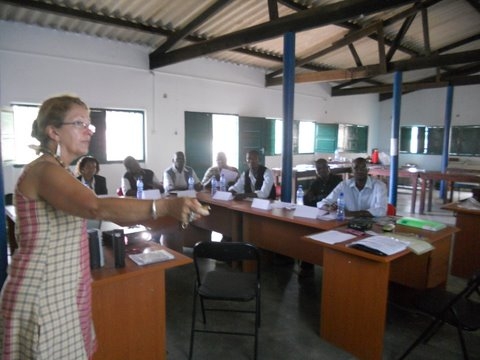
The journalists who showed up for training on health issues have almost no formal training in the basics of journalism, let alone how to cover health news. Knight Fellow Mercedes Sayagues, standing, conducted the training session. (Photo by Emanuel Pereira)
Here are some quick facts from 2007 census data that will give you a sense of just how impoverished this district really is:
- Nine out of 10 houses are built of mud and straw.
- Sixty percent have only a traditional latrine, and 30 percent have no latrine at all.
- The illiteracy rate for those 15 and older is 48 percent.
- About half the families have a radio; fewer than 1 percent have a TV.
With so many illiterate adults and so few televisions, neighbors and friends often gather around the nearest radio for news reports. This is why Mueda’s community radio is so vital to conveying health news to the 120,000 residents.
The one radio station in the region, Mueda Community Radio, has eight staff and one security guard. It is one of 35 stations set up by the government’s Institute for Social Communication (ICS), , and they enjoy a rare degree of stability. The station is housed in an air-conditioned metal container and has well maintained equipment – albeit not digital because ICS prefers analog. This creates the first problem: an erratic supply of the tapes used for recording interviews and stories. “We are reusing the tapes to the point of bad quality,” says technician Zao Ali Issufo.
A couple of other challenges: Only one of the original reporters trained when the radio opened in 2002 remains, and the new recruits have little or no journalistic training. Also, there is no access to e-mail or Internet. But the team attempts to make up for these shortfalls with enthusiasm.
Of the eight, six showed up for the training on health reporting. I brought photocopied training manuals on health and AIDS reporting and on investigative reporting, as well as lots of newspapers and photocopies of health stories from the Savana newsroom in Maputo, which were much appreciated.
Often reporters here think that health reporting is about getting people to use condoms and wash their hands. This may be an outcome but there is a lot more to it. Health reporting shows the fractures and faults of a society, the inequalities. We looked at the power of statistics and numbers. They may seem dry but they take the pulse of a nation: how we live, how we die, and why. I introduced them to the first Equity in Health Study in Mozambique, presented in 2011. We examined some stats – and learned how to read below the surface and put a human face to the numbers:
- The national averages mask deep disparities: A child in Cabo Delgado Province is three times more likely to die before age 5 than a child in Maputo.
- Cabo Delgado and Zambezia provinces are the poorest and have the greatest health needs, yet they receive the smaller percentage of health budget. Why is that? How would this be reported?
- Forty-five percent of children suffer from chronic malnutrition. Why? What is the impact on their lives as kids and adults?
By now it was noon and the heat was rising. I cut the exercises short, and we went for tea in the courtyard under a flowering Flamboyant tree, known for its scarlet flowers. When I left, the reporters had a new found respect for their occupation, and a new enthusiasm for the impact they can have. I am eager to hear, in the coming weeks, about the stories this training has led to.
Editor's note: Knight International Journalism Fellow Mercedes Sayagues recently led a training session on health reporting for the community radio journalists of Mueda, an isolated district of Cabo Delgado Province more than 1,400 miles north of Mozambique’s capital city of Maputo.